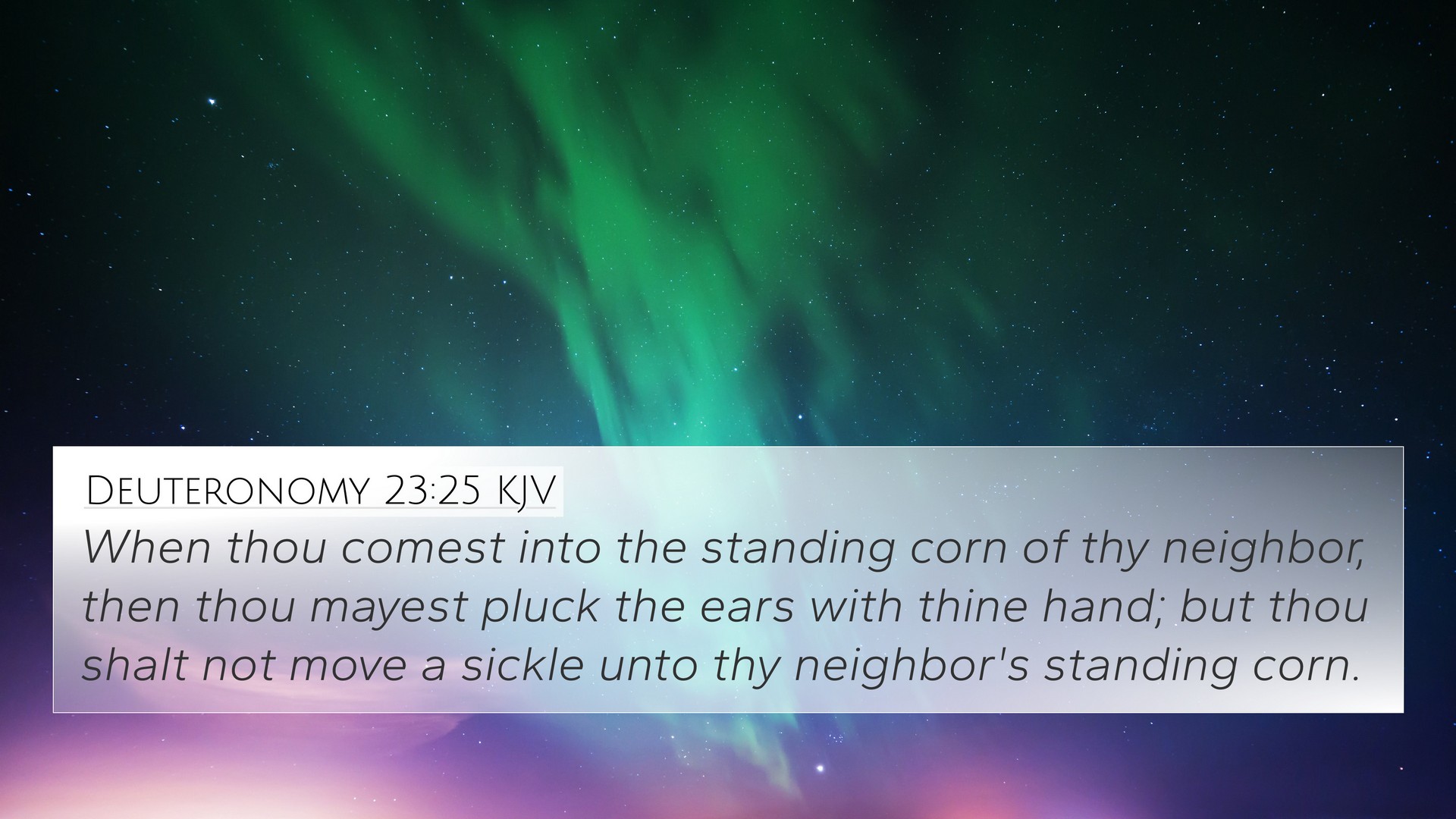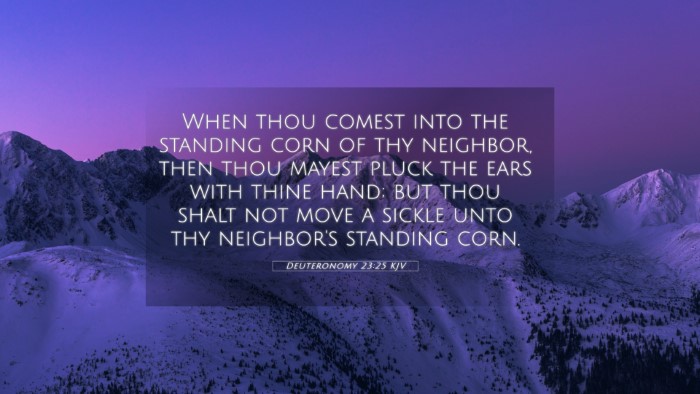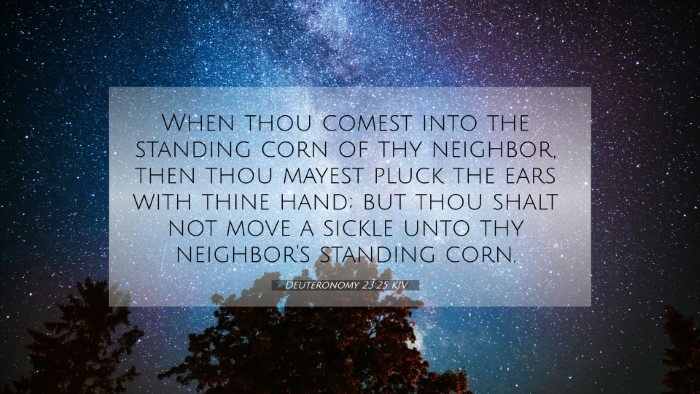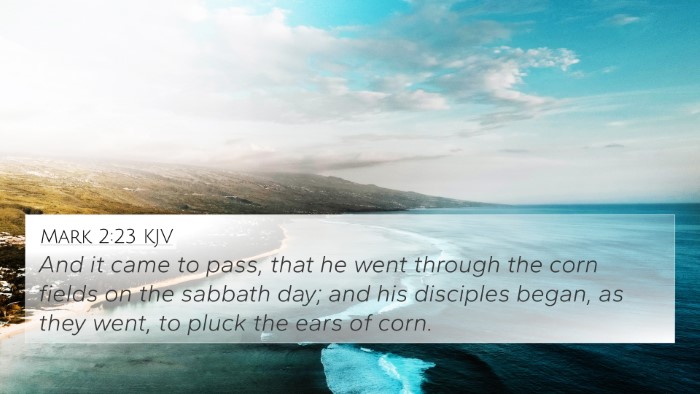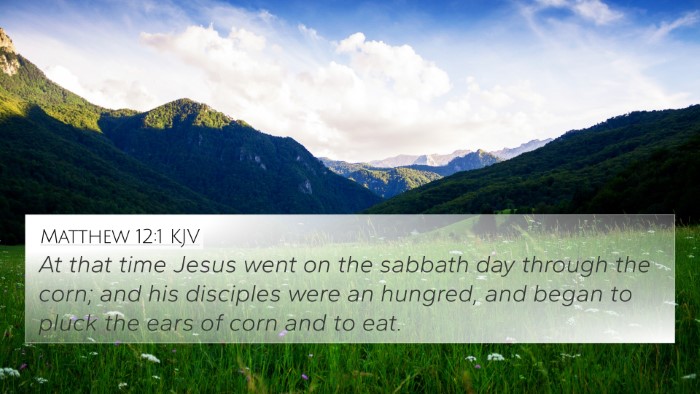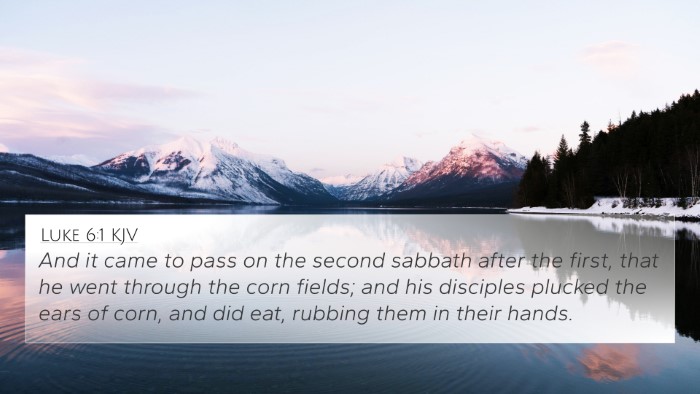Understanding Deuteronomy 23:25
Deuteronomy 23:25 states: "When you come into your neighbor’s vineyard, you may eat your fill of grapes as you wish, but you shall not put any in your bag." This verse outlines the principles of sharing and limits the consumption of another's property to what can be eaten at the moment.
Meaning and Interpretation
This verse addresses issues of property rights, generosity, and respect for one’s neighbor. It emphasizes the importance of maintaining boundaries while also promoting the act of sharing in communal relationships.
Insights from Public Domain Commentaries
-
Matthew Henry's Commentary:
Henry emphasizes the moral lesson embedded in this verse. He notes that the permission to eat grapes from a neighbor's vineyard signifies the respect for communal generosity. However, the restriction on taking grapes with you serves to maintain boundaries and discourage entitlement.
-
Albert Barnes' Notes:
Barnes highlights the underlying principle of this law, which is to promote kindness and the spirit of neighborliness. He comments on how the law recognizes human needs while also protecting property rights, fostering both generosity and responsibility in community living.
-
Adam Clarke's Commentary:
Clarke elaborates on the social dynamics involved, suggesting that the law was created to address the relational aspects of daily life. He sees it as an encouragement to trust one another without exploiting the generosity of others, thus fostering a sense of community and mutual respect.
Bible Cross-References
Deuteronomy 23:25 connects to several other Bible verses that echo its themes and principles:
- Leviticus 19:9-10: Discusses leaving the harvest for the poor and the alien as an act of kindness, reinforcing sharing what belongs to others.
- Exodus 20:15: Provides the command not to steal, which resonates with maintaining respect for others’ properties.
- Matthew 12:1: Relates to the disciples eating grain on the Sabbath, reflecting the spirit of divine law versus human rituals.
- Luke 6:31: The Golden Rule, encouraging people to treat others how they wish to be treated, underlining respect in interactions.
- Proverbs 25:17: Advises not to visit your neighbor too often, highlighting the importance of boundaries in relationships.
- Galatians 6:2: Instructs believers to bear one another's burdens, reflecting the willingness to share and support each other.
- James 2:15-16: Speaks to the need for active love and support for those in need, reinforcing communal responsibility.
Thematic Connections
The principle of sharing from the bounty of one's own harvest while respecting another’s property is a recurring theme in Scripture. The linked verses demonstrate a biblical emphasis on community ethics and the importance of living harmoniously as neighbors:
- Property Rights vs. Community Needs: Various passages discuss the balance between individual rights and communal responsibilities.
- Generosity and Boundaries: Biblical texts provide a framework of generosity within the confines of respect for others' belongings.
- Social Justice and Nepotism: Common themes in the Old and New Testaments encourage fairness in how we treat the less fortunate.
Cross-Referencing and Study Tools
Understanding the significance of Deuteronomy 23:25 can be enhanced through tools for Bible cross-referencing. Here are some methods and resources:
- Utilizing a Bible concordance to find verses related to sharing and property rights.
- Engaging in cross-reference Bible study to explore parallels across scriptures.
- Employing a Bible cross-reference guide for deeper thematic connections.
- Participating in Bible study groups to explore community insights and shared interpretations.
Conclusion
Deuteronomy 23:25 serves as a significant verse for understanding the dynamics of property rights and communal relationships within the Biblical context. Through cross-referencing, we can better appreciate the connections between various scriptures and their underlying themes of generosity, respect, and community ethics.
By delving into the rich interplay of biblical texts, we can discover deeper spiritual truths and guidance for our everyday interactions with others.
